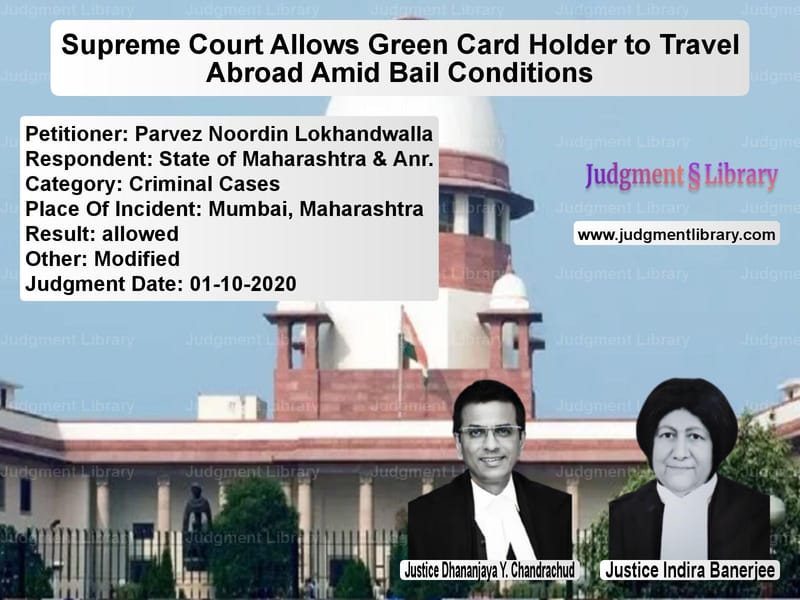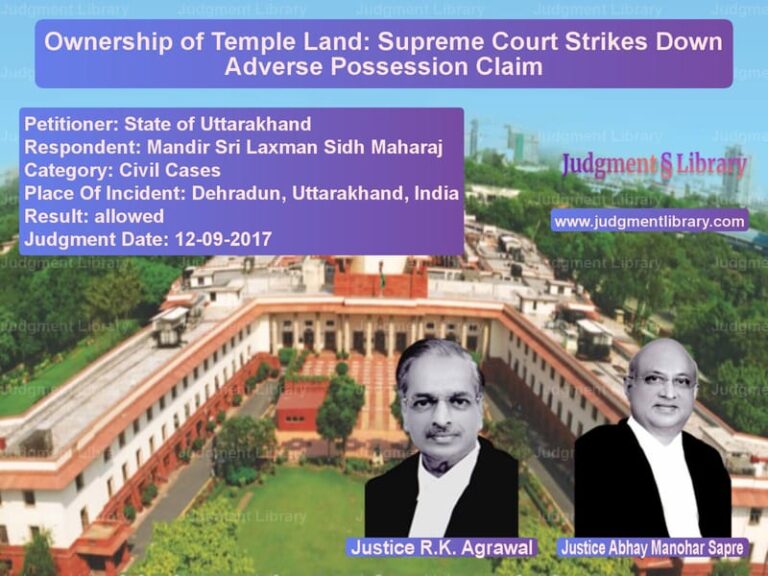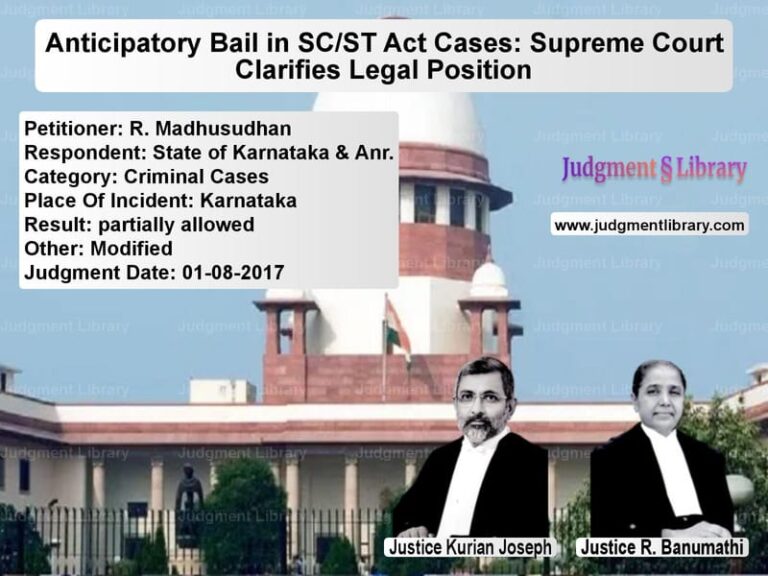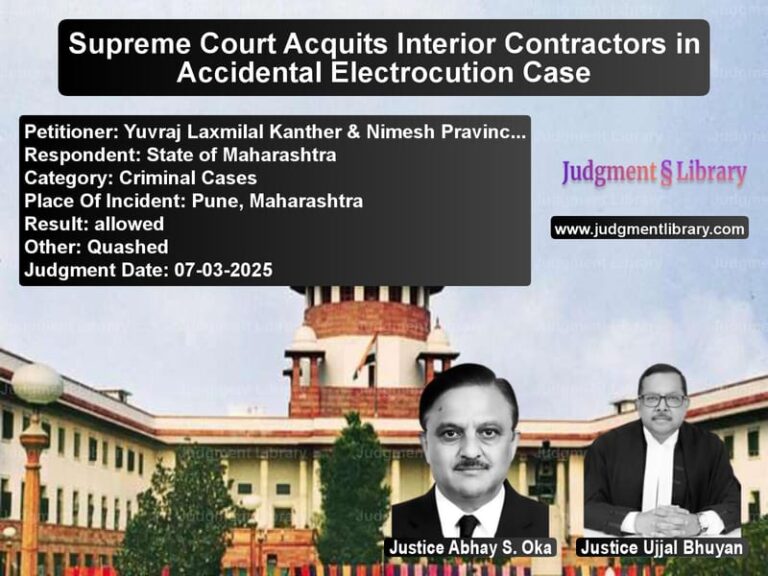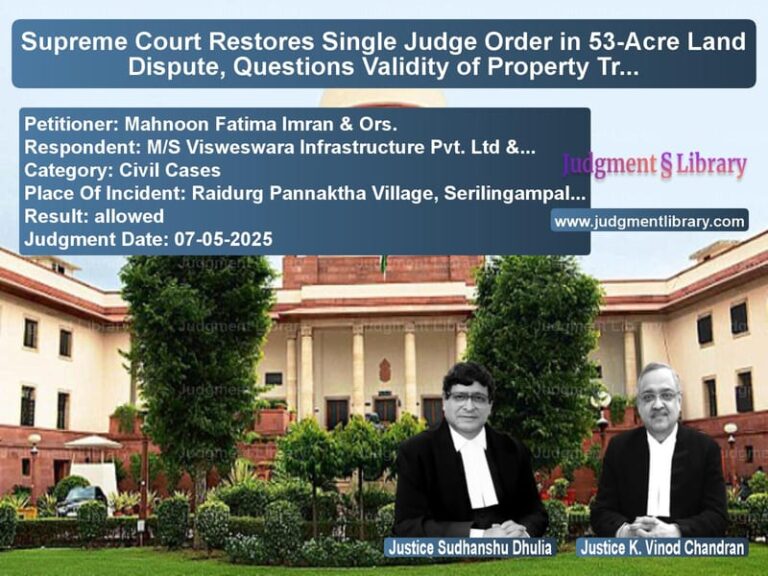Supreme Court Allows Green Card Holder to Travel Abroad Amid Bail Conditions
The case of Parvez Noordin Lokhandwalla vs. State of Maharashtra & Anr. is a significant ruling by the Supreme Court of India concerning the fundamental right to travel abroad while under bail conditions. The Court addressed the issue of whether an individual facing criminal charges in India could be permitted to travel abroad, especially when the consequences of denial could lead to the invalidation of their residency status in another country.
The judgment is crucial as it balances individual liberty with the need to ensure justice and prevent accused individuals from evading trial.
Background of the Case
The case arose from a criminal complaint filed in January 2014 by Mehraj Rajabali Merchant, alleging that the appellant, Parvez Noordin Lokhandwalla, had fabricated a Power of Attorney document by forging the signature of his brother, Shalin Lokhandwalla. This led to an FIR being registered against the appellant on 22 April 2014 under Sections 420, 467, 468, 469, 470, 471, and 474 of the Indian Penal Code (IPC), read with Section 34 IPC.
Legal Dispute and Bail Proceedings
The appellant had been residing in the United States since 1985 and held a Green Card. He frequently traveled between the U.S. and India, with records showing at least 16 visits between 2015 and 2020. On 21 February 2020, he was arrested in Mumbai under a lookout notice based on the FIR.
Following his arrest, he applied for bail:
- The Sessions Court rejected his bail application on 4 May 2020.
- He then approached the Bombay High Court, which granted him temporary bail on 19 May 2020, imposing the following conditions:
- Surrender of passport and Green Card.
- Restriction from leaving the jurisdiction of Thane Police without prior permission.
- Furnishing a personal bond of Rs. 25,000 with sureties.
Subsequently, the appellant sought permission to travel to the U.S. for eight weeks, citing the requirement to return to the U.S. within a stipulated time to maintain his Green Card status.
Petitioner’s (Parvez Noordin Lokhandwalla) Arguments
The petitioner, represented by senior counsel Subhash Jha, argued:
- He was a lawful U.S. resident and had no intention of fleeing.
- His travel to the U.S. was necessary to revalidate his Green Card, failing which he would lose his right to reside there.
- He had a history of returning to India for legal proceedings, demonstrating compliance with judicial orders.
- The nature of the allegations did not necessitate custodial interrogation.
- He was willing to provide an undertaking to return to India and appear for all trial dates.
Respondent’s (State of Maharashtra) Arguments
The State, represented by Sachin Patil, opposed the request, arguing:
- The appellant had not complied with his bail conditions by failing to surrender after the expiration of the eight-week bail period.
- Since the appellant was facing criminal charges, there was no guarantee of his return if allowed to travel.
- The Court should focus on ensuring that the accused remained available for trial.
Supreme Court’s Observations and Judgment
The Supreme Court, led by Dr. Dhananjaya Y. Chandrachud and Indira Banerjee, made the following key observations:
- Right to Travel: The Court reaffirmed that the right to travel abroad is a fundamental right under Article 21 of the Constitution and should not be denied arbitrarily.
- No Risk of Absconding: Given the appellant’s consistent travel record between the U.S. and India, the Court found no justification for assuming he would flee.
- Proportionality of Bail Conditions: Courts must balance public interest in criminal prosecution with the fundamental rights of an accused.
- Undertaking to Return: The Court emphasized that the appellant’s willingness to provide an undertaking to return was an important factor in granting permission.
Final Judgment
The Supreme Court ruled:
- The High Court’s decision denying permission to travel abroad was set aside.
- The appellant was permitted to travel to the U.S. for eight weeks, subject to the following conditions:
- He must provide an undertaking to return within the stipulated period.
- His passport and Green Card shall be handed back to him before travel and re-submitted upon his return.
- He must appear before the trial court on all hearing dates unless exempted.
- Future travel requests must be made before the trial court.
Conclusion
The Supreme Court’s ruling ensures that bail conditions do not become excessively restrictive and disproportionate. While upholding the importance of securing an accused’s presence for trial, the Court recognized the petitioner’s right to travel for valid reasons. This case sets a precedent in ensuring that bail conditions align with constitutional rights and do not unduly infringe on personal liberty.
Petitioner Name: Parvez Noordin Lokhandwalla.Respondent Name: State of Maharashtra & Anr..Judgment By: Justice Dhananjaya Y. Chandrachud, Justice Indira Banerjee.Place Of Incident: Mumbai, Maharashtra.Judgment Date: 01-10-2020.
Don’t miss out on the full details! Download the complete judgment in PDF format below and gain valuable insights instantly!
Download Judgment: Parvez Noordin Lokha vs State of Maharashtra Supreme Court of India Judgment Dated 01-10-2020.pdf
Direct Downlaod Judgment: Direct downlaod this Judgment
See all petitions in Bail and Anticipatory Bail
See all petitions in Fraud and Forgery
See all petitions in Judgment by Dhananjaya Y Chandrachud
See all petitions in Judgment by Indira Banerjee
See all petitions in allowed
See all petitions in Modified
See all petitions in supreme court of India judgments October 2020
See all petitions in 2020 judgments
See all posts in Criminal Cases Category
See all allowed petitions in Criminal Cases Category
See all Dismissed petitions in Criminal Cases Category
See all partially allowed petitions in Criminal Cases Category

